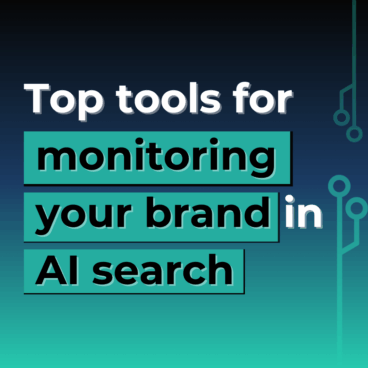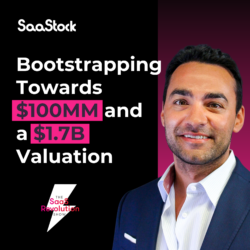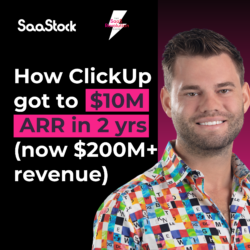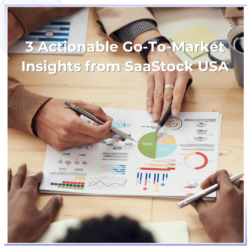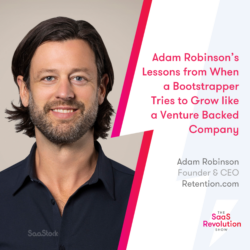AI search is changing how buyers find software.
In June 2025, AI platforms including ChatGPT, Gemini, Perplexity, Grok, and CoPilot generated more than 1.1B referral visits (a 357% YoY increase), according to Similarweb.
While Google still dominates overall, research suggests that traffic from LLMs converts at a higher rate. Semrush found that AI search visitors can be 4.4 times as valuable as the average visit from traditional organic search, based on conversion rate.
So, while the volume catches up, the quality of the traffic is already proving its worth.
With LLM search volume growing, tracking Google rankings is no longer enough. To get ahead, you need to understand if and how your brand is appearing in AI-generated answers.
The process is similar to how you track SEO but the optimisations, tools, and searches are different. And like most emerging categories, AI search monitoring tools are appearing thick and fast, with every one making big promises.
At the same time, budgets remain tight, and there’s pressure to consolidate tech stacks, so every tool needs to earn its place.
In this post, we’ll take you through what you need to know about AI search and the top tools for monitoring your brand visibility.
What is AI search?
AI search refers to searches that take place inside LLMs, rather than traditional search engines like Google, Bing, or Yahoo. It also encompasses answers that appear in Google’s AI Overview and AI mode.
It marks a different way of searching. Rather than using traditional keywords, users ask longer, more conversational questions and receive a direct answer. For example:
- ‘Best CRM’ becomes ‘What’s the best CRM for a B2B SaaS startup’?
- ‘HubSpot alternatives’ becomes ‘Which tools are good alternatives to HubSpot?’
- ‘How to scale outbound’ becomes ‘What’s the fastest way to scale outbound in SaaS?’
Unlike traditional search, ChatGPT, Perplexity, Gemini, Copilot, and Grok don’t just provide links to relevant websites. They instead provide summaries, comparison tables, shortlists, and direct recommendations.
The answers provided can also be bespoke because these tools retain context from conversation history. For the examples above, the LLM might factor in the user’s industry, business stage, location, ideal customer profile, and more before providing an answer.
It takes the concept of a ‘search ranking’ and adds new dimensions including: mentions, recommendations, and sentiment. Sometimes referred to as Answer Engine Optimisation (AEO) or Generative Engine Optimisation (GEO), this process borrows the foundations of SEO but with some new concepts to consider.
What AI search engines look for
Under the hood, AI search leans on many of the same fundamentals as Google: strong SEO foundations, clear positioning, third-party validation, and real brand demand. The difference is how that gets surfaced. Instead of ten links, users usually see one answer or a short shortlist.
So, at first, visibility shifts from “where did we rank?” to “did we get named at all?”
In practice, brands that show up most often tend to be:
- Easy to categorise.
- Consistently described across the web.
- Regularly referenced in trusted third-party contexts.
- Backed by real users and real activity.
At a practical level, brands who show up in AI answers:
- Know exactly what their customers are searching for,
- Describe what they do in simple, repeatable language,
- And show up consistently across the wider ecosystem, not just on their own site.
Example: Tally
Tally is a free form builder similar to Typeform and Jotform. But unlike these two giants, Tally bootstrapped its way to $4M ARR with just five people thanks to thousands of ChatGPT leads. By using semantic keyword clusters that ChatGPT likes, such as ‘free form tool for construction workers in Kentucky,’ it outranked Jotform, Typeform and even HubSpot.
Top AI search monitoring tools
Semrush One
Semrush has long been a go-to for keyword research, backlink tracking, and competitor analysis. Semrush One brings SEO and AI search visibility into one, connected workflow.
With Semrush One, you can monitor brand presence across Google, ChatGPT, Gemini, Perplexity, and others under a single subscription.
Features
With Semrush One, you can:
- Measure where your brand appears across all major platforms
- Benchmark your visibility against competitors.
- Run gap analysis to help you find new keywords, prompts, and content opportunities.
- Access a unified reporting experience across all search platforms.
Pricing:
- 7-day free trial
- Prices start at $199/month
Ahrefs – Brand Radar AI
Ahrefs is one of the most widely used platforms for SEO, backlink data, and competitive intelligence. Brand Radar AI extends the platform’s capabilities to include AI search visibility.
An add-on to its existing packages, Brand Radar AI tracks how often your brand appears across AI platforms like ChatGPT, Perplexity, Google AI Overviews, Copilot, and Gemini, and benchmarks those appearances against competitors. It also offers share of voice metrics, as well as tracking across YouTube and TikTok.
Features
With Ahrefs Brand Radar AI, you can:
- Track brand mentions across major AI platforms.
- Measure share of voice in AI-generated answers.
- See which prompts and topics trigger visibility.
- Identify unlinked brand mentions.
- Monitor cross-channel brand presence, including YouTube and TikTok (with Reddit coming soon).
Pricing
Ahrefs plans start at $99/month (excluding the $23/month starter plan)
Brand Radar AI is priced as an add-on:
- Single platform tracking (e.g. ChatGPT only): from $159/month
- Full platform tracking (Google AI Overviews, ChatGPT, Perplexity, Copilot, Gemini): from $560/month
Goodie AI
Founded in 2023, Goodie AI was one of the first platforms built specifically for Answer Engine Optimisation (AEO) and AI search visibility. Unlike legacy SEO platforms that have bolted on AI features, Goodie was built AI-first and is focused on helping teams understand how they appear inside AI-driven search engines .
Goodie tracks performance across 10 models, including ChatGPT, Gemini, Grok, Claude, and Perplexity. Beyond brand tracking Goodie offers a content writing tool and other optimisation features for marketing teams.
Features
With Goodie AI, you can:
- Track brand visibility across 10+ leading AI models.
- Monitor how your brand is described and framed in AI answers.
- Identify where competitors are being cited instead of you.
- Analyse sentiment and context, not just mentions.
- Use built-in tooling for content creation and optimisation.
- Access deeper diagnostics on why your brand is or isn’t appearing.
Pricing
Goodie is a product for enterprise and midmarket customers. As such it does not have public pricing or tiers. Pricing is determined on the specific needs of the customer.
OtterlyAI
OtterlyAI is another tool dedicated to tracking AI search visibility.
The platform provides detailed insights at the prompt level across ChatGPT, Google AI Overviews, Perplexity, and Microsoft Copilot. It tracks whether your brand is mentioned or your website is cited and also analyses how you are represented – evaluating brand sentiment and overall visibility in AI-generated responses.
Features
With OtterlyAI, you can:
- Track brand mentions and website citations across major AI platforms.
- Monitor prompt-level visibility and conduct keyword research.
- Analyse how your brand is represented, including sentiment.
- Access daily visibility reports to spot changes as they happen.
- Use the built-in GEO audit to assess your site across 25+ AI-specific factors.
Pricing
Plans start at $29/month. Goodie also offers enterprise pricing and a number of add-ons including extra search prompts and tracking for Google AI mode and Gemini.
SurferSEO
SurferSEO is best known for content optimisation and SERP analysis, helping teams write pages that align with what already ranks in Google. Its AI Tracker extends that workflow into AI-powered search, letting you see whether your brand or content appears inside tools like ChatGPT, Perplexity, and Google AI Overviews.
An add-on to its core offering, AI Tracker shows your AI search performance provides the insights and tools to help you grow that presence further.
Features
With Surfer’s AI Tracker, you can:
- Monitor brand and topic visibility across supported AI platforms.
- See which prompts surface your brand or content.
- Review how often you’re cited or mentioned over time.
- Identify which competitors appear alongside you.
- Move directly from visibility data into updated content briefs and optimisation work inside Surfer.
Pricing
Plans start at $79/month rising to enterprise level.
AI tracker is available as an add-on to an existing plan and costs $95/month.
Peec AI
Peec AI is an AI search analytics platform that helps teams track, analyse, and improve brand performance on AI platforms like ChatGPT, Google AI Overviews, and Perplexity.
Peec AI helps brands understand how they are represented in AI answers and how that changes over time. A specialist in AI platforms, Peec allows teams to filter down to model, country IP, and prompt intent level for deeper insights.
Features
With Peec AI, teams can:
- Track brand mentions across supported AI platforms.
- Monitor how brands are described within AI-generated answers.
- Compare visibility against competitors.
- Analyse which prompts and questions surface brand mentions.
- Observe trends and changes in AI visibility over time.
Pricing
Plans start at €89/month and go up to enterprise level.
Scrunch
Scrunch is a platform for monitoring and improving brand visibility in AI search. Its Monitoring & Insights product shows you how your brand shows up in AI results, where you’re being cited, and how you compare to competitors across major LLMs like ChatGPT, Claude, Gemini and others.
Features
With Scrunch, you can:
- Track brand presence and position across major AI platforms.
- Analyse prompt-level visibility and sentiment.
- See which external sites are being cited for your category.
- Compare AI visibility against competitors.
- Identify technical or content gaps affecting how AI tools interpret your site.
Pricing
Plans start at $250/month and run through to bespoke enterprise pricing.
How to get started with AI search
The important thing with AI search is to get started. If you don’t, you risk getting left behind.
Speaking on our podcast, Nathan Latka (CEO, Founderpath) shared some tips:
- Start from a strong SEO foundation. That means a domain rating 50/60+ and a strong backlink profile.
- Optimise high traffic pages: Update H1s to reflect the search queries customers are asking AI agents. For example, rather than “Premier capital source for software founders” Founderpath might use “Top three non-dilutive capital sources for software companies.”
- Train the AI to include your company in results: Email your users and ask them to:
- Repeat the search (e.g. top email marketing tools)
- Follow up with the AI on why your company wasn’t mentioned–including a line about why it should be.
Learn more about staying visible in AI search
Whether you choose a broad SEO suite like Semrush or Ahrefs or a specialist tool like Otterly or Peec, the important thing is understanding how your brand is showing up in AI search and where that sits in your wider GTM strategy.
At SaaStock, we work with thousands of B2B SaaS founders and GTM leaders each year and share how they’re navigating this shift. If you want to go deeper, check out these practical insights:
- How AI Is changing SaaS and search: Insights from Mike Walrath (Yext)
- 6 AI use cases for scaling SaaS GTM
- Budget friendly SaaS marketing: How to scale faster with AI
- SaaS copywriting: How to stand out when everyone sounds the same
